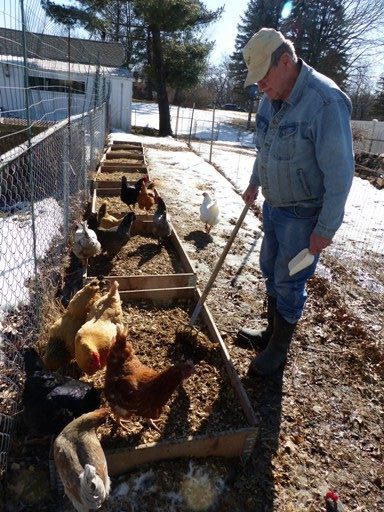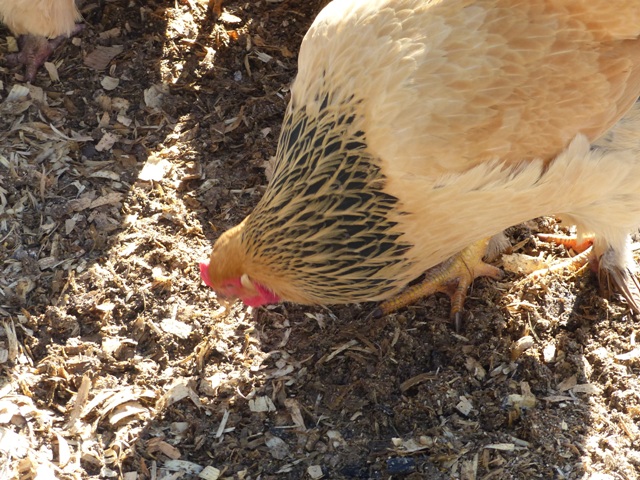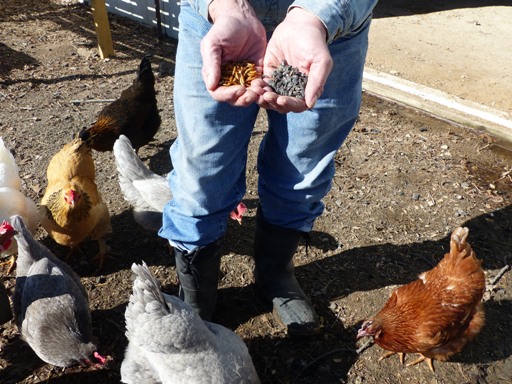Chickens in the Garden

Few foods are as appealing to a hungry chicken as a bunch of young lettuce or spinach sprouts poking through the spring soil. Given the chance, a few hens will quickly devour plants intended for their owner’s kitchen.
Ironically, few soil additives are as appreciated by lettuce, spinach and other vegetables as chicken manure. Plants seem to leap from the ground and produce human food in abundance when stimulated by the droppings that chickens produce every day.
The trick to achieving both healthy chickens and an abundant garden is managing the flock in a way that the hens help the gardener instead of their gobbling down valued veggies.
Here are a few ways to manage a flock for garden abundance:
The Double-Run System
Probably the best and easiest way to manage a flock and garden is to create a double run. The chicken run is simply the fenced in area where the birds enjoy daylight hours lounging, dusting their feathers, and foraging for seeds, insects, tender sprouts, and bits of stone that helps their digestion. Over the course of the day they deposit their droppings randomly.
Most coops have just a single run, but often the owner can convert this into a double-run system. The bigger and sunnier the area the better.
Stretch a wire mesh fence six or eight feet tall to split the run roughly in half. Devise a way to allow the chickens to access only one side of the run at a time. The rest is easy.
In one gardening season let the hens into only one side. Plant the garden in the other. Next year, reverse it. It’s an outstanding way to rotate crops and nutrients.

Seasonal Helpers
Many flock owners don’t have enough room to create the double-run system described above. They can still use chickens to help with gardening chores.
For most common garden vegetables, it’s vital to keep the birds excluded during the growing season. Otherwise they’ll harvest the crops. However, usually there are several weeks after the snow melts but before it’s warm enough to plant seeds. Come fall once the season’s last vegetables are harvested, there is often a long cooling window of time until the ground freezes and snow falls. These are prime times for chickens to enjoy gleaning tasty morsels from the garden.
Chickens have superb vision, strong legs and feet, and nimble pointed beaks. They gleefully spend hours scratching up the soil. Humans might call it tilling. Their sharp eyes spot tiny weed seeds and insect eggs and larvae. Their pointed beaks snatch them from the soil and turn them into delicious protein filled food. Chickens remove the seeds and bugs that can pester next year’s vegetable plants and convert them to food.
Turn a flock loose in early spring or late fall and hens will usually head right for the rich garden soil hiding delicious goodies, but there’s a way to encourage them to target the places that need the most chicken foot rototilling. Bait them by scattering a few handfuls of dried mealworms or black oil sunflower seeds – those in the hull – in the garden and rake them gently into the soil. Hens love mealworms and sunflower seeds. In the process of hunting these goodies they’ll loosen and soften the soil and discover hidden insects and weed seeds.

Excluding Chickens from The Garden
Many people can’t let their chickens forage in the garden, but they can still blend vegetable and chicken husbandry. It’s simple. Weeds and vegetable waste mixed with chicken manure and manure-laden litter decay into outstanding compost. Work the compost into the soil before seed planting and watch the vegetables flourish upward.
Much research is being done on the benefits of using chickens to restore degraded grasslands in China and Europe. Essentially scientists are finding how helpful it is to let hens access land. Dr. Carl Rosier works for the Rodale Institute at Etzel’s Sugar Grove Farm near Cedar Rapids, Iowa, studying ways to improve soils in cropland. “Chicken manure stimulates plant growth and increases soil productivity, water holding capacity, and nutrient retention. In a nutshell chickens, when incorporated into the garden correctly, can help bring balance to the soil ecosystem,” he said.
Many families that keep chickens also enjoy growing beans, tomatoes, and many other vegetables. It feels good to bring both fresh eggs and crops into the kitchen. Meshing chickens with gardening is a perfect way to maximize food production while improving the soil’s health.
